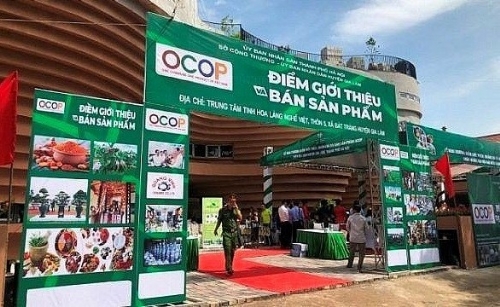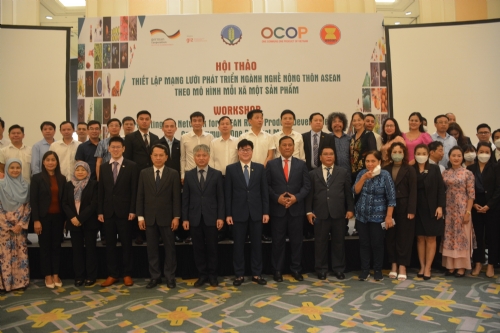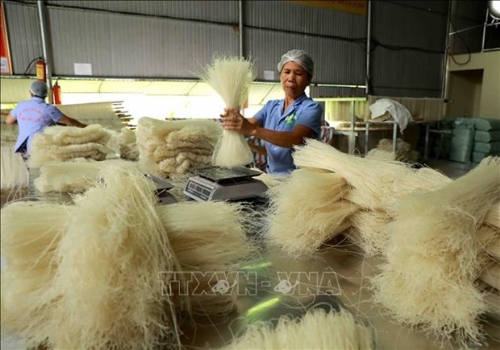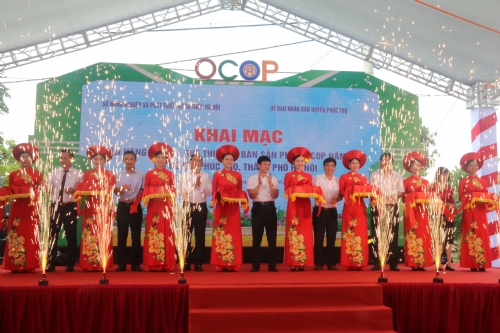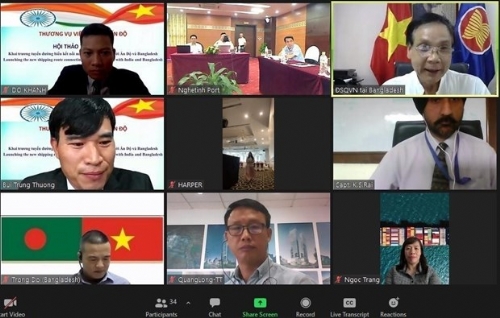Export Support Rules
Thursday, December 20, 2018 16:34
State-backed export credit policy is part of overall macroeconomic policies applied to support strategic exports that the State encourages. In each period, depending on the actual situation, and economic development objectives in general and export development objectives in particular, the Government has revised its policies to meet economic development requirements
The government-backed export credit policy was adopted and applied in Vietnam for the first time under the Prime Minister's Decision 133/2001/QD-TTg and assigned to the Development Assistance Fund. Accordingly, enterprises, economic entities and individuals that make and trade exports shall be provided with preferential credits to carry out business projects and plans under the export encouragement policy of the Government. Lending forms applicable under this Decision cover both medium and long-term credit (medium and long-term investment loans, post-investment interest rate support, investment credit guarantee) and short-term credit granting (including short-term loans, bid security and export contract performance guarantee). Characteristically, export credit forms under Decision 133/2001/QD-TTg are diverse in terms of time (short, medium and long-term) and contain State preferences, especially lending rates and loan guarantees.
In 2006, together with the establishment of the Vietnam Development Bank (VDB) from the restructuring of the Development Assistance Fund, the export credit policy under the above decision of the Prime Minister was replaced by Decree 151/2006/ND-CP of the Government and assigned to the Vietnam Development Bank. Accordingly, the export credit policy is carried out in the form of export loans (including exporter and importer loans), export credit guarantee, tender guarantee and export contract enforcement guarantee. Compared with the export credit policy stipulated in Decision 133/2001/QD-TTg, the new one eliminated medium and long-term funding forms and added some short-term credit granting forms like importer loans and export credit guarantee. At the same time, regulations on lending interest rates and loan guarantees also have big changes under which interest rates of export credits are decided by the Ministry of Finance under market principles and loan security and export credit guarantee are carried out under general laws on loan security.
After five years of carrying out the above-mentioned decree, the export credit policy was revised by Government Decree 75/2011/ND-CP dated August 30, 2011 on credit investment and credit export.
Compared with Decree 151/2006/ND-CP, major changes in the export credit policy in the new decree are forms of export credit financing has been narrowed significantly, leaving only contractual exporter loan and contractual importer loan involved in products in the list of government-issued export credit loans. The lending interest rate and loan security mechanism is basically similar to Decree 151/2006/ND-CP, under which lending interest rates are announced by the Ministry of Finance under market principles, while export credit guarantee is done according to the law.
Circular 35/2012/TT-BTC dated March 2, 2012 of the Ministry of Finance provided guidance to some articles of the Government's Decree 75/2011/ND-CP dated August 30, 2011, on State investment credit and export credits.
Decree 53/2013/ND-CP dated May 22, 2013, on supplementing the Government's Decree 75/2011/ND-CP dated August 30, 2011, on State investment credit and export credit.
Enforcing Resolution 05-NQ/TW of the Party Central Committee and Resolution 07-NQ/TW of the Politburo, in 2017, the Government issued many new policies, including export tax and import tax policies in order to further improve the business environment, enhance competitiveness and support enterprises to develop sustainably.
On November 16, 2017, the Government issued Decree 125/2017/ND-CP amending Decree 122/2016/ND-CP on preferential import and export tariffs, absolute tax, mixed tax and import tax beyond tariff quotas. The issuance of Decree 125/2017/ND-CP addresses some export issues:
Firstly, unifying the list of exported and imported goods of Vietnam issued together with Circular 65/2017/TT-BTC dated June 27, 2017 to carry out intra-ASEAN commitments and matching Decree 08/2015/ND-CP.
Secondly, dealing with proposals for import and export tariff amendments by authorities (Ministry of Industry and Trade, Ministry of Planning and Investment, Ministry of Science and Technology), business associations (Vietnam Steel Association, Vietnam Timber and Forest Product Association), customs offices and enterprises.
Thirdly, limiting impacts of abolishing import duty as committed in the Free Trade Agreement (FTA) from 2018 onwards when preferential import duties in preferential import tariffs fall sharply.
Particularly, the special preferential tariff will be reduced to zero according to the ASEAN Trade in Goods Agreement (ATIGA) in 2018 - 2022 or ATIGA Tariff.
Accordingly, from January 1, 2018, as many as 98.26 per cent of ATIGA tariff lines will be slashed to zero, including completely built vehicles. This will exert certain impacts on the Vietnamese car market and automobile industry.
Apart from above-mentioned purposes, the Government's Decree 125/2017/ND-CP features new amendments on export tax rates, commodity descriptions and technical qualifications of nine commodity groups. Specifically, two groups are subject to tax hikes: Round timber from 10 per cent to 25 per cent, and sawn or chipped timber from 10 per cent and 20 per cent to 25 per cent. Five groups are imposed tax cuts (bar and shaped aluminium from 7 per cent to 5 per cent; unworked ingot aluminium from 10 per cent to 5 per cent; refined iron ores from 40 per cent to 20 per cent; slag from 10 per cent to 5 per cent; and bar and shaped copper from 10 per cent to 5 per cent). One group - charcoal made from forest wood - is revised for description and one group - fine and superfine silicon oxide - is added technical specifications.
Directive 25/CT-TTg dated August 31, 2018 on tasks and solutions to production development and export promotion requires ministries, sectors and localities to further implement solutions proposed in Resolution 19/NQ-CP, Resolution 35/NQ-CP and reform measures to improve the investment and business environment, remove bottlenecks to production, processing and export, and facilitate exportation. At the same time, the decree requires ministries to expeditiously review some regulations on production and import of raw materials for production and processing of enterprises.
Other news
- HANOI: Promoting the consumption of craft village products and developing community tourism(11/5/2022 3:16:04 PM)
- Chuong My: Effectiveness from the One Commune One Product Program(11/3/2022 10:04:10 AM)
- Thanh Hoa develops OCOP products(11/1/2022 1:30:31 PM)
- Promoting the network for Asia Rural Product Development on one commune one product(8/30/2022 9:43:23 AM)
- Phu Tho eyes 56 new 3-star OCOP products for 2022(8/23/2022 3:09:56 PM)
- Opening of the OCOP product introduction week in Hanoi in 2022 in Phuc Tho district(8/1/2022 3:28:38 PM)
- Shipping route connecting central Vietnam, India inaugurated(7/29/2022 11:22:05 AM)
- Reference exchange rate down 4 VND on July 27(7/27/2022 11:42:14 AM)
- WB, Japan support greater access to legal services for the poor in Vietnam(7/27/2022 11:37:13 AM)
- Evaluation and classification of OCOP products Hoan Kiem District in 2022(7/27/2022 10:10:23 AM)
The featured news
-
HANOI: Promoting the consumption of craft village products and developing community tourism
-
Promoting the network for Asia Rural Product Development on one commune one product
-
Phu Tho eyes 56 new 3-star OCOP products for 2022
-
Opening of the OCOP product introduction week in Hanoi in 2022 in Phuc Tho district
-
Shipping route connecting central Vietnam, India inaugurated


